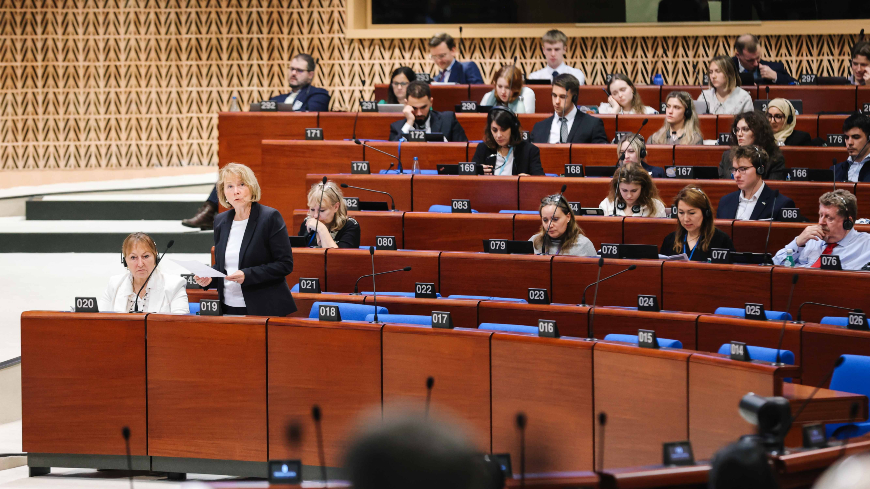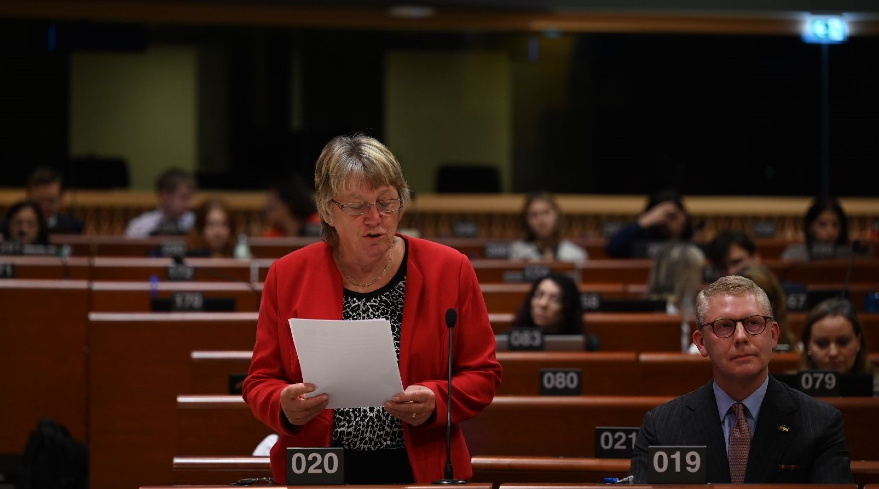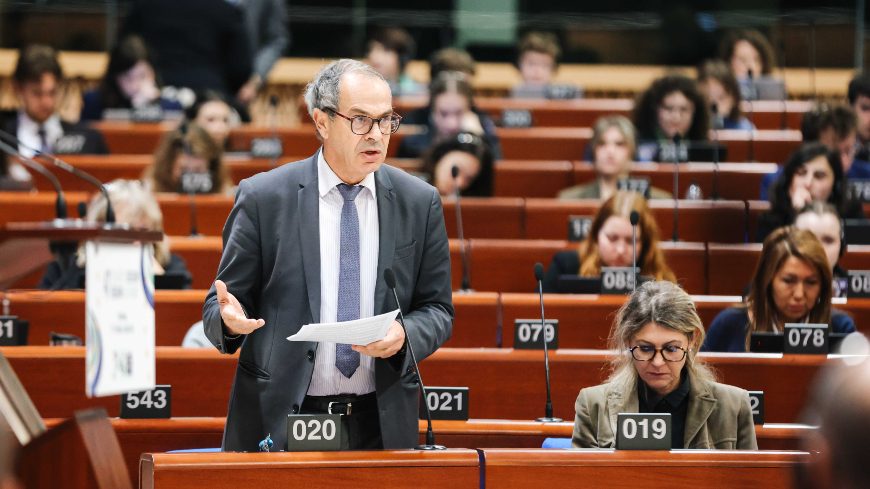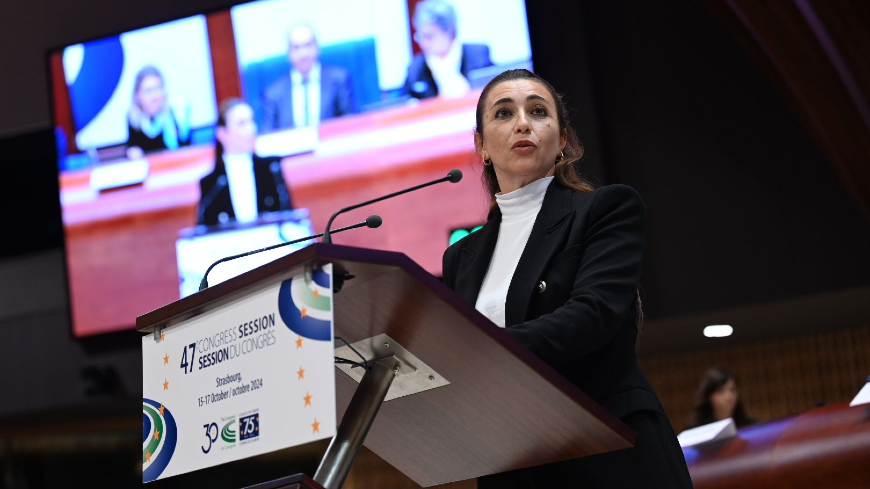In 2014, the Congress became the first European assembly to involve youth delegates in its work and allow them to speak at its sessions. Since then, the youth delegates have not only rejuvenated politics within the Congress but have also helped to “reinvigorate democracy”. This unique and successful example of integrating young people into political life should be replicated in all member states by elected local and regional assemblies, said the Congress in a debate followed by the adoption of a resolution.
Ten years ago, some members of the Congress were sceptical about this outstretched hand to young people, fearing in particular that it would slow down its work. But today, said Véronique Bertholle (France, L, SOC/V/DP), Congress thematic spokesperson on youth, no one questions this participation, which is even seen as a way of strengthening the institution. “Since 2014, you have breathed new life into Congress perspectives”, she stressed, addressing the youth delegates: in ten years, 419 young people from all member states, one from each country, have taken up the mantle as youth delegates.
Jani Kokko (Finland, L, SOC/V/DP), co-rapporteur on the resolution on The integration of youth perspectives in local and regional democratic life, stressed the need to further increase the role of young people in this area. The ongoing work on the Revised European Charter on the Participation of Young People in Local and Regional Life will take account of developments in recent years, including in communication techniques popular with young people, primarily digital tools, and will offer tools for cooperation between local and regional authorities and young people. In Finland, Jani Kokko emphasised, young people are already very much involved in political life, from the local and regional level right up to the national parliament, where they make a considerable contribution.
A session chaired by a youth delegate to talk about young people's projects
As a symbol of the Congress’ commitment in this field, Congress President Marc Cools (Belgium, L, ILDG) handed over his seat to a youth delegate (Thomas Olsen AARHEIM, Norway) to chair the rest of the debate, during which several youth delegates presented concrete projects that they had carried out in their countries.
Jon Kola (Albania), Jack O'Connor (Ireland), Sandra Slušnytė (Lithuania) and Lisa Cruz Lackner (Andorra) looked at how the cities of Tirana, Limerick, Vilnius and Andorra la Vella are applying the Charter on Youth Participation. Anna Ramkovica (Latvia) wanted to learn about how young people from linguistic minorities - mainly Russian speakers - in the city of Jūrmala perceived their integration in relation to speakers of Latvian, the majority language. In San Marino, Maya Tentoni developed a very popular podcast to inform young people about the elections and the candidates' programmes. Henrik Harjus (Estonia) developed an application and a game enabling young people in Tartu to find out about the activities and missions of local authorities while walking around the city. Panagiotis Moumtsakis (Greece) worked on political and social engagement in cities and regions affected by the terrible fires of summer 2021. For Afia Mansoor Ahmed (Germany), summing up all the projects implemented by the 40 youth delegates in 2024, these “have enabled us to share our experiences, to improve dialogue between young people and local authorities, but also between young people themselves”. She thanked the Congress for “helping us shape our future”.
During the debate, many other youth delegates, as well as several Congress members, welcomed the success of the initiative launched in 2014. Many of the elected representatives noted that the motivation of the youth delegates had increased year on year. This was to be expected, added Hasan Akguün (Türkiye, L, SOC/V/DP), because “in our country too, the more our young people participate in local public life, the more interested they become”.
Involving youth delegates more closely in the work of national delegations
Serbian youth delegate Jovana Milurović (Serbia) believes that young people are still not sufficiently heard by international organisations, even though their opinions are essential for a more inclusive and democratic society. “We don't just want to participate, we also want to shape the future”, she added. Aida Karimli (Sweden, R, ILDG) felt that “now that we have given young people a voice, we need to listen to them”.
Soeren Schumacher (Germany, R, SOC/V/DP) strongly emphasised this point, while at the same time being critical of certain national delegations to the Congress which, in his view, did not involve young people enough in their activities: “It is not enough to invite young people to the plenary sessions; they must be genuinely involved in our work from the outset”, he said. What's more, added two other members, “when you really work with young people, you are impressed by the quality of their commitment; they are inspiring and refreshing”.
Concluding the debate, Véronique Bertholle hoped that other international assemblies would one day include young delegates in their composition, as the Congress is still the only one to have done so. She expressed the hope that youth delegates would be more representative of the diversity of young people. Finally, she pointed out that one in five of the elected representatives in her city, Strasbourg, is under the age of 30, proof that the participation of young people is already a daily reality there.
 Mediabox Interview with Vérionique Bertholle
Mediabox Interview with Vérionique Bertholle
 Mediabox Interview with Afia Mansoor Ahmed
Mediabox Interview with Afia Mansoor Ahmed
 Mediabox Interview with Ivan Donev
Mediabox Interview with Ivan Donev
 Congress Rejuvenating Politics Initiative: 10 years of making democracy younger
Congress Rejuvenating Politics Initiative: 10 years of making democracy younger
***
47th Session
Agenda – Web file – Photos





















































